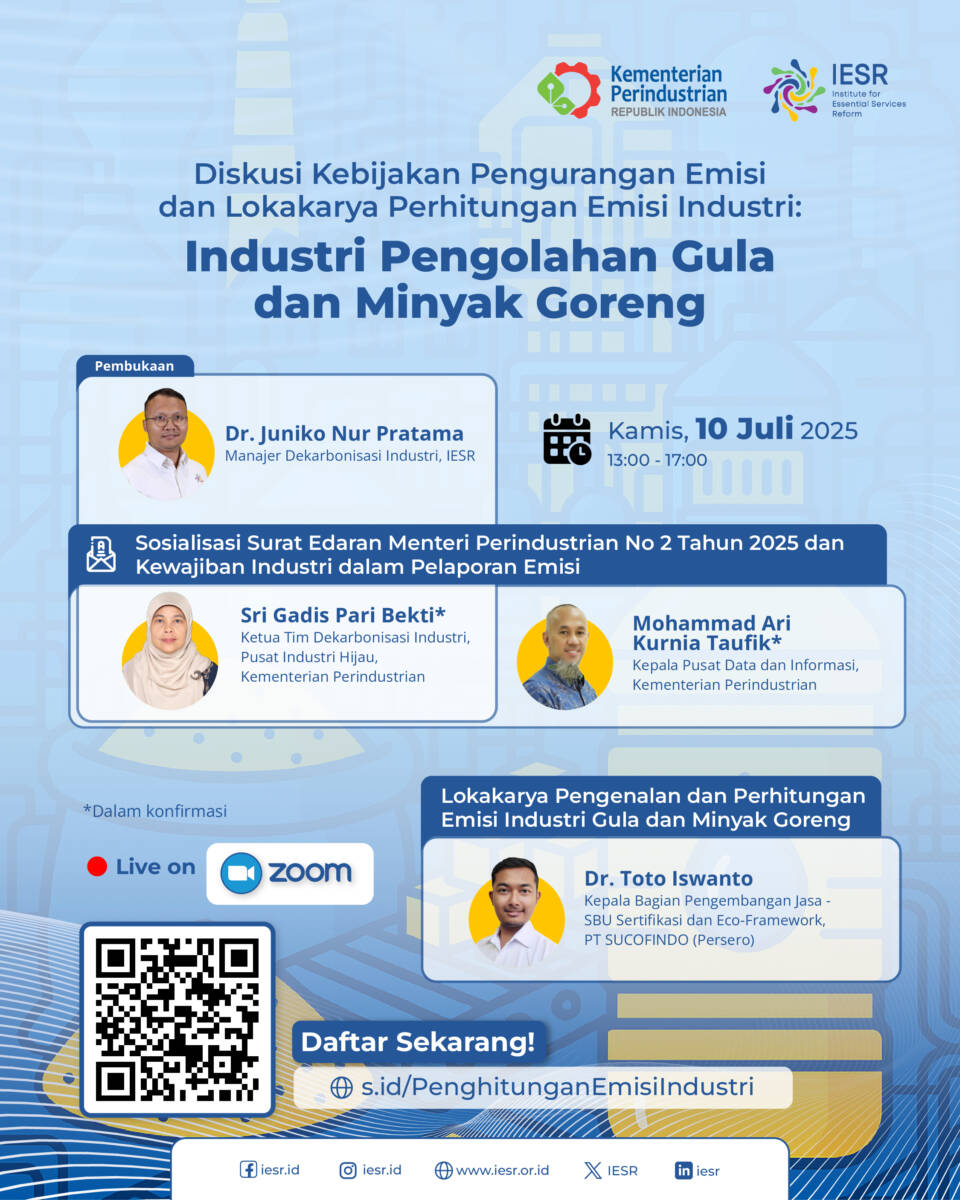
Webinar Discussion on Emission Reduction Policy and Industrial Emission Calculation Workshop: Sugar and Cooking Oil Processing Industry
Background
Accelerating the transition to sustainable industrial development also has an important influence on efforts to achieve the national target of Net Zero Emission by 2060 or sooner. In the Enhanced Nationally Determined Contribution (E-NDC) document, Indonesia is committed to reducing carbon emissions by 31.89 percent with its own efforts and 43.2 percent with international assistance1 by 2030. However, currently greenhouse gas emissions from the industrial sector in Indonesia have continued to increase from 2011 to 2022, with the amount of emissions in 2022 reaching more than 400 million tons of carbon dioxide equivalent2.
The sugar and cooking oil industries are the two main sectors of the food industry in Indonesia. Products from these two industries are consumed by both household consumers but also industrial and business consumers. Household and industrial sugar consumption will reach 22.48 kg per capita in 2024, while Indonesian cooking oil consumption per capita will reach 9.56 kg per capita in 2023. Along with the rapid increase in Indonesia’s population, demand for products from these industries is expected to continue to increase, requiring serious attention, especially to the sustainability of production and its environmental impact.
The sugar and cooking oil industries are two types of food industries with the highest energy consumption due to their high demand and the need for a lot of heat energy in their production processes. Existing data shows that both industries have a high dependence on fossil-based energy, both for the provision of electricity and heat, especially from coal and diesel. This dependence makes both industries contribute significant greenhouse gas (GHG) emissions. The results of this study’s modeling show that the emission figures for the two industries reach 7.8 million metric tons of CO2eq (sugar: 2.6 million tons of CO2e, palm cooking oil: 5.2 million tons of CO2e). This condition is a challenge in Indonesia’s efforts to achieve its emission reduction targets in accordance with global climate change commitments.
Therefore, the Ministry of Industry encourages the transformation towards a green industry through strategic policies, including the preparation of the Industrial Decarbonization Roadmap for nine priority sub-sectors, as well as the issuance of Circular Letter of the Minister of Industry No. 2 of 2025 concerning Submission of Industrial Emission Data through the National Industrial Information System (SIINas) which aims to build a credible, accurate, and transparent industrial emission database as a basis for formulating industrial sector decarbonization policies. Accurate emission data is essential to monitor the condition of industrial emissions produced by Industrial Companies and Industrial Estate Companies, and also as a foundation in the carbon trading system, where industry players can contribute through the carbon market mechanism being developed in Indonesia, such as the Indonesian Carbon Exchange (IDX Carbon). Currently, the carbon trading mechanism in Indonesia is regulated in Presidential Regulation Number 98 of 2021 concerning the Implementation of Carbon Economic Value (NEK) for Achieving NDC Targets and Emission Control in National Development.
In order to support the transformation of a more environmentally friendly and highly competitive industry through emission reduction policies and reporting, the Emission Reduction Policy Discussion and Industrial Emission Calculation Workshop: Sugar and Cooking Oil Processing Industry was held. The decarbonization roadmap for the sugar and cooking oil industry that has been prepared is expected to be a guideline for industry players and other key actors in making more environmentally friendly policies and actions.
Event Objective:
- Socializing the Circular Letter of the Minister of Industry Number 2 of 2025 to sugar and palm oil industry companies regarding the obligation to submit industrial emission data through SIINas.
- Introducing SIINas as the main platform for reporting industrial emissions in the early stages of implementation, including the benefits and mechanisms of its use.
- Providing an initial introduction to the data structure that needs to be reported in SIINas, including industrial emission categories and parameters used.
- Explaining the basic concepts of sources and activity data for calculating Greenhouse Gas (GHG) emissions that will be applied in the reporting process.
- Preparing the industry to participate in national and international carbon trading mechanisms by ensuring systematic and documented emission recording.
- Building a more transparent and accountable industrial ecosystem in emission management based on accurate and verified data.
Presentation
Emission Control Reporting Guide – Industrial Companies – IESR
Panduan-Pelaporan-Pengendalian-Emisi-Perusahaan-Industri-IESRSocialization of Minister of Industry Circular Letter No. 2 of 2025 – Green Industry Center
Sosialisasi-SE-Menperin-No-2-Tahun-2025-Pusat-Industri-HijauWorkshop on Introduction and Calculation of Pollutant and GHG Emission Data and Emission Sources and Data Acquisition for the Sugar and Cooking Oil Industry – IDSurvey
Lokakarya-Pengenalan-dan-Penghitungan-Data-Emisi-Polutan-dan-GRK-serta-Sumber-Emisi-dan-Perolehan-Data-Industri-Gula-dan-Minyak-Goreng-IDSurveySpeakers
-
Dr. Juniko Nur Pratama - Industrial Decarbonization Program Manager - IESR
-
Green Industry Center - Ministry of Industry
-
Data and Information Center - Ministry of Industry

